|
 Secure Site
Secure Site
|
 |
Archive for the 'Progressive Awakening' Category
 Dream, Pablo Picasso Birds do it. Cats do it. And Spaniards most especially do it—every day, in broad daylight.
They nap. Proudly, without a hint of embarrassment. Grown adults—executives, teachers, civil servants—wink off in the middle of the workday like kindergartners at mat time. From 1 or 2 o’clock to 4:30 or so every afternoon, Spain stops the world for a stroll home, a leisurely meal, a few z’s. Common Market technocrats have informed the Spanish that this is not the way things will get done in the oft-threatened unified Europe. The Spanish reply with a flourish of rioja and snooze alarms. ¡Viva siesta!
At a time when productivity is the world’s largest religion, the siesta tradition lives on. In Spain, work operates under the command of life, instead of the other way around. No task is so critical that it can’t wait a couple of hours while you attend to more important matters like eating, relaxing, or catching up on sleep from a night on the town. When the midday break hits, offices empty and streets clear as if by the hand of Rod Serling. Befuddled foreigners left behind quickly learn that they have entered a new circadian order.
Taking a long break in the middle of the day is not only healthier than the conventional lunch; it’s apparently more natural. Sleep researchers have found that the Spanish biorhythm may be tuned more closely to our biological clocks. Studies suggest that humans are “biphasic” creatures, requiring days broken up by two periods of sleep instead of one up-till-you-drop “monophasic” shift. The drowsiness you feel after lunch comes not from the food but from the time of day. “All animals, including humans, have a biological rhythm,” explains Claudio Stampi, director of the Chrono Biology Research Institute in Newton, Massachusetts. “One is a 24-hour rhythm—we get tired by the end of the day and go to sleep—and there is a secondary peak of sleepiness and a decrease in alertness in the early afternoon. Some people have difficulty remaining awake, doing any sort of task between one and four in the afternoon. For others it’s less difficult, but it’s there. So there is a biological reason for siestas.”
 Digital Zen Alarm Clocks, available in maple, walnut, bamboo, and black lacquer Unlike the average lunch break, the siesta is a true break in the action because there is no choice but to come to a full and complete stop. You can’t do errands; the shops are closed. You can’t make business calls; nobody’s at the office. Most people go home for lunch, or get together with family or friends for a glass of vino, and nod out afterwards.
Like a lot of us in the land of time scarcity, I find it harder and harder to shut it off, to switch off work mode and be social—that is, be unproductive, and just be. The divide is blurred by a volatile economy of all-consuming competition that has turned off-hours into off-site catch-up. Blink and it’s Monday again. The culprit, says David Scott, an associate professor of recreation, park, and tourism sciences at Texas A&M, is the accelerating cult of efficiency.
“We are an efficiency-oriented society,” he says. “It is perhaps the dominant value in this culture. The faster things get done, the better off we’re going to be. The idea of efficiency at all costs seems to be all-pervasive. It tends to invade our leisure. Unfortunately, socializing doesn’t have a ‘yield.’ It’s hard to develop relationships; those things take time.”
The siesta lifestyle is rooted in a culture with values that are anathema to the ascendant economic order, so don’t expect the rest of Europe to adopt Spanish hours. A few Spanish firms have begun shortening their siesta time as the eurodollar era approaches. But maybe, being the great taskmasters we are, we could find a way to put one quality-of-life item on the agenda each day. We could even give it a productive rationale: Life expectancy in Spain is two years longer than in the United States. Think of all that extra output.
Our Digital Zen Clock’s long-resonating Tibetan bell-like chime makes waking up a beautiful experience – its progressive chimes begin your day with grace. When the clock’s alarm is triggered, the acoustic chime bar is struck just once … 3-1/2 minutes later it strikes again … chime strikes become more frequent over 10 minutes … eventually striking every 5 seconds until shut off. As they become more frequent, the gentle chimes will always wake you up – your body really doesn’t need to be awakened harshly, with a Zen Clock you’re awakened more gradually and thus more naturally.
What makes this gentle awakening experience so exquisite is the sound of the natural acoustic chime, which has been tuned to produce the same tones as the tuning forks used by musical therapists. According to the product’s inventor, Steve McIntosh, “once you experience this way of being gradually awakened with beautiful acoustic tones, no other alarm clock will ever do.”
adapted from Escape Mazaine, July 1998
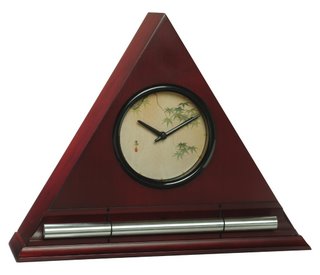 Japanese Leaves Dial Face in Burgundy Finish by Now & Zen Now & Zen – The Peaceful Chime Alarm Clock Store
1638 Pearl Street
Boulder, CO 80302
(800) 779-6383
Posted in Chime Alarm Clocks, Japanese Inspired Zen Clocks, mindfulness practice, Natural Awakening, Now & Zen Alarm Clocks, Progressive Awakening, Sleep Habits, Well-being
 rest and relaxation You know a little too well what your kitchen looks like at 3 a.m. You’ve memorized the light patterns on your bedroom ceiling, counted thousands of sheep, and watched your Zen Alarm Clock for countless hours. And you’ve come to expect the thump of the newspaper at the front door a few minutes after 5.
If this sounds familiar, you’re in good company: Sixty-seven percent of American women surveyed in last year’s National Sleep Foundation poll said they regularly have trouble sleeping. Many of the culprits are hallmarks of our current culture: long work hours, stress, sugar-laden cappuccinos, wanting to fit too much into one day. Several recent reports, including a study published in Social Science & Medicine titled “Is Sleep Really for Sissies?,” have suggested that we value what we do during the day much more than what goes on at night.
But good sleep isn’t something we can afford to take off our to-do list. Like a nutritious diet and exercise, sleep is a foundation for health — not to mention sanity.
“It’s a bedrock,” says Paul Glovinsky, Ph.D., coauthor of “The Insomnia Answer.” As anyone with sleep trouble knows, a single bad night can hamper productivity, memory, even basic conversation skills. But it’s over time that insomnia really takes its toll. “We’ve seen that, in all kinds of ways, deficits accrue when you don’t sleep.”
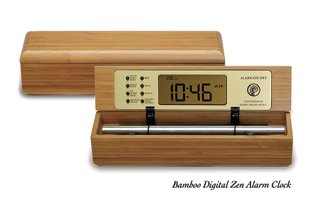 Bamboo Digital Chime Clock, for a progressive awakening Poor sleep may set you up for heart problems, for instance, plus lowered immunity, depression, diabetes, obesity, and chronic pain. One study actually proved that sleep deprivation can damage our mood in a very real way: Compared with those of rested people, the emotional centers of the brain in sleep-deprived people were 60 percent more reactive to negative experiences.
So what’s a droopy-eyed, overcaffeinated, dream-deficient woman to do? Committing to good sleep hygiene is a start. But it also pays to identify your unique sleep profile. There’s no single insomnia pattern; there are many. And delving into the details of yours can help you overcome it.
We went to several sleep experts with some common sleep types, like the person who can’t stop thinking, the one who wakes up at odd times, and the one who keeps finding excuses to push off bedtime (Really? Another episode of “House Hunters?”).
As it turns out, these patterns often have distinct causes and solutions. Don’t be surprised if more than one profile rings true; your patterns may fluctuate. The key is to give some serious thought to your sleep life. Use The Zen Timepiece with the Bowl /Gong to waken you. Try turing it around so that the digital display doesn’t show. The quality of your waking life — not to mention your health — depends on it.
Boulder, Colorado—an innovative company has taken one of life’s most unpleasant experiences (being startled awake by your alarm clock early Monday morning), and transformed it into something to actually look forward to. “The Zen Alarm Clock,” uses soothing acoustic chimes that awaken users gently and gradually, making waking up a real pleasure.
The luxurious awakening provided by the Zen Alarm Clock is part of the growing preference for things natural—natural foods, natural fibers, and now, natural acoustic sounds. Like organic tomatoes in your salad, the organic sounds of the Zen Alarm Clock’s sweet acoustic chimes are truly a gourmet experience.
What makes this gentle awakening experience so exquisite is the sound of the natural acoustic chime, which has been tuned to produce the same tones as the tuning forks used by musical therapists. According to the product’s inventor, Steve McIntosh, “once you experience this way of being gradually awakened with beautiful acoustic tones, no other alarm clock will ever do.”
Adapted from Body + Soul Magazine, May 2008 by Sarah Schmelling
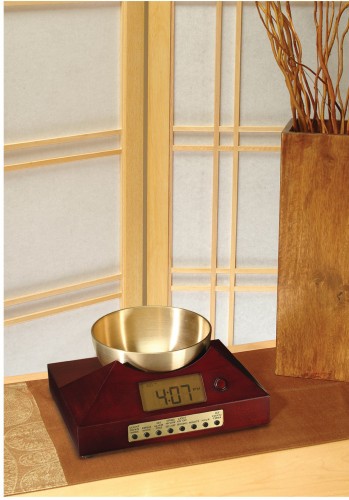 Zen Alarm Clock for a Gentle Awakening with a Bowl Gong and Mindfulness Timer Now & Zen’s Alarm Clock Shop
1638 Pearl Street
Boulder, CO 80302
(800) 779-6383
Posted in Bamboo Chime Clocks, Chime Alarm Clocks, Japanese Inspired Zen Clocks, Natural Awakening, Now & Zen Alarm Clocks, Progressive Awakening, Sleep Habits, Ukiyo-e, wabi-sabi, Well-being, Zen Timepiece by Now & Zen, Zen Timers
 Harunobu Suzuki, A Girl Collecting Chrysanthemum Dew by the Stream Meditation is often credited with helping people feel more focused and energetic, but are the benefits measurable?
A new study suggests that they are. When researchers tested the alertness of volunteers, they found that the practice proved more effective than naps, exercise or caffeine. The results were presented at a recent conference of the Society for Neuroscience.
The researchers, led by Prashant Kaul of the University of Kentucky, took 12 students who did not meditate and taught them the basics in two short sessions.
Then, over a series of weeks, the students were asked to come in and take a test devised to measure skills like reaction time. The tests involved a series of visual cues on a display screen that the volunteers had to react to by pushing the correct button.
The students were asked to take the tests in mid- to late afternoon, when people tend to be sleepiest. They did so before and after 40 minutes of meditating, napping or exercising, or after taking caffeine. Napping produced poor results, presumably because of “sleep inertia,” the researchers said.
Caffeine helped, and exercise was unpredictable.
Earlier studies have found that people are awake while meditating but that their brains undergo changes similar to patterns found in sleep. Some studies have found that people who meditate a lot report sleeping less, so the researchers were curious to see if meditation could serve the same function as sleep. The results support the idea that it can.
In fact, when some of the students were asked to skip a night’s sleep and then take the test, the researchers said, meditation was even more helpful.
Although meditation can be done in almost any context, practitioners usually employ a quiet, tranquil space, a meditation cushion or bench, and some kind of timing device to time the meditation session. Ideally, the more these accoutrements can be integrated the better. Thus, it is conducive to a satisfying meditation practice to have a timer or clock that is tranquil and beautiful. Using a kitchen timer or beeper watch is less than ideal. And it was with these considerations in mind that we designed our digital Zen Alarm Clock and practice timer. This unique “Zen Clock” features a long-resonating acoustic chime that brings the meditation session to a gradual close, preserving the environment of stillness while also acting as an effective time signal.
adapted from The New York Times, October 2006 by Eric Nagourney
 Digital Zen Alarm Clocks, meditation timers and alarm clocks with chimes Now & Zen’s Meditation Timer Store
1638 Pearl Street
Boulder, CO 80302
Posted in Chime Alarm Clocks, Japanese Inspired Zen Clocks, Meditation Timers, Meditation Tools, Natural Awakening, Now & Zen Alarm Clocks, Progressive Awakening, Sleep Habits, Well-being
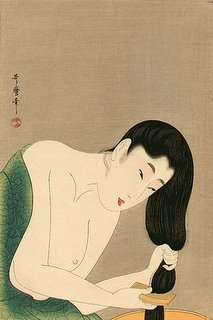 Utamaro Kitagawa, Bijin Combing Her Hair, 1750-1806 The key to create a wind-down period before bedtime is to create some space between your busy day and sleep time. “You can’t just work until 9 at night, and then stick your head on the pillow and fall asleep,” Khalsa says. So turn off the television, computer, and radio. Cut down on or eliminate evening classes and exercise that leaves you feeling amped up.
When you come home, honor this transition by playing relaxing music, lighting candles, or putting on your favorite pajamas and set your Zen Alarm Clock. Think of the yoga precept of pratyahara: Withdraw your senses in order to turn inward.
Our unique “Zen Clock” features a long-resonating acoustic chime that brings the meditation session to a gradual close, preserving the environment of stillness while also acting as an effective time signal.
adapted from yogajournal.com ‘Sweet Slumber’ by Nora Isaacs
 Zen Alarm Clock for a Gentle Awakening with a Bowl Gong
Now & Zen’s Chime Timer
1638 Pearl Street
Boulder, CO 80302
Posted in Bamboo Chime Clocks, Japanese Inspired Zen Clocks, Meditation Timers, Meditation Tools, mindfulness practice, Natural Awakening, Now & Zen Alarm Clocks, Progressive Awakening, Sleep Habits, Ukiyo-e, Well-being, Zen Timepiece by Now & Zen, Zen Timers
 Utamaro Kitagawa, A Mother Dozing While Her Child Topples a Fish Bowl A recent poll at the McGraw-Hill Companies posed this question to a few thousand employees: if there were more hours in the day, would you work, sleep, relax, socialize, or play? For the overwhelming majority, the answer was a no-brainer: sleep.
This is serious news: the Institute of Medicine of the National Academy of Sciences reports that sleep-related fatigue costs U.S. businesses $150 billion annually in absenteeism, accidents, and lost productivity. Charles Czeisler, M.D., a professor of sleep medicine at Harvard Medical School, has found that pulling an all-nighter or sleeping as little as four to five hours daily for a week produces the level of cognitive impairment experienced by a person who is legally drunk. Yet we glorify people who sacrifice sleep.
The U.S. is not the only sleep-deprived nation. As globalization takes its toll, cities in Spain are seeing the disappearance of the siesta due to long commutes that make a midday trip home impractical.
The problem even has Japan taking snoozing seriously. High school teachers in some areas are dimming the lights to give students a power nap. And in Bangkok, Thailand, last November, civil servants were encouraged to take naps at lunchtime in a room where cell phones are banned.
Sara Mednick, Ph.D., author of Take a Nap! Change Your Life, says that napping is also catching on in New York City, where MetroNaps, with its space-age-style sleep pods, offers respite at its location in the Empire State Building, and Yelo, a sleep salon on West 57th Street, provides hexagonal sleeping pods.
Meanwhile, the Medical Journal of Australia sang the praises of the 10-minute power nap, and the Australian organization SIESTA (Society for the Introduction of Extra Sleeping Time in the Afternoon) quotes specialists from the Adelaide Institute of Sleep Health on the mental and physical benefits of the nap. They join Harvard and Columbia studies suggesting that napping helps the brain process information and reduces accidents at work and on the road. Just tell that to the boss when you doze off! Be sure to set your Zen Alarm Clock to waken you gradually and gently so you can get back to work refreshed and altert.
 Chime Alarm Clock with Soothing Sounds Boulder, Colorado—an innovative company has taken one of life’s most unpleasant experiences (being startled awake by your alarm clock early Monday morning), and transformed it into something to actually look forward to. “The Zen Alarm Clock,” uses soothing acoustic chimes that awaken users gently and gradually, making waking up a real pleasure. Rather than an artificial recorded sound played through a speaker, the Zen Clock features an alloy chime bar similar to a wind chime. When the clock’s alarm is triggered, its chime produces a long-resonating, beautiful acoustic tone reminiscent of a temple gong. Then, as the ring tone gradually fades away, the clock remains silent until it automatically strikes again three minutes later. The frequency of the chime strikes gradually increase over ten-minutes, eventually striking every five seconds, so they are guaranteed to wake up even the heaviest sleeper.
adapted from Spirituality and Health Magazine, May 2007 by Swaha Devi
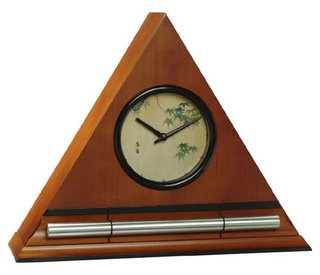 Zen Chime Clock with Japanese Maple Leaves in Honey Finish Now & Zen’s Soothing Alarm Clock Store
1638 Pearl Street
Boulder, CO 80302
Posted in Bamboo Chime Clocks, Chime Alarm Clocks, Japanese Inspired Zen Clocks, Natural Awakening, Now & Zen Alarm Clocks, Progressive Awakening, Sleep Habits
 still the mind Despite the oft-heard instruction to “still the mind,” a meditation practice is not meant to help you get rid of all your thoughts—and you wouldn’t want it to. Your ability to think is, after all, one of the greatest gifts in life, something to truly cherish.
When you start a meditation practice, you are simply training yourself to become more aware of your thoughts and, more important, of how you relate to them—a process that can change the very landscape of your life.
Using a kitchen timer or beeper watch is less than ideal. And it was with these considerations in mind that we designed our digital Zen Alarm Clock and practice timer. This unique “Zen Clock” features a long-resonating acoustic chime that brings the meditation session to a gradual close, preserving the environment of stillness while also acting as an effective time signal.
adapted from Yoga Journal, ‘Presence of Mind’ by Janice Gates
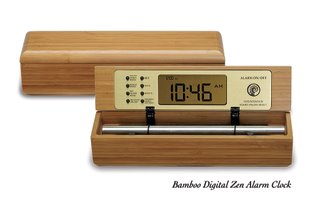 Bamboo Zen Timers, a meditation timer Now & Zen’s Chime Meditation Timer Shop
1638 Pearl Street
Boulder, CO 80302
Posted in Japanese Inspired Zen Clocks, Meditation Timers, Meditation Tools, Now & Zen Alarm Clocks, Progressive Awakening, Well-being, Yoga Timer, Zen Timers
Just Breathe
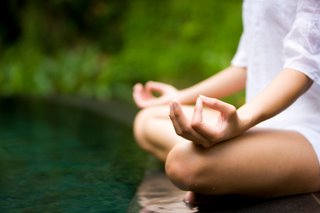 meditation, just breathe Find a comfortable seated position and begin by observing your natural breath. Notice the texture, length, and rhythm as the breath flows in and out of your body. Feel the temperature of the air as it touches your nostrils. Take note, too, of pauses between breaths.
As thoughts arise, note them, but then allow them to float by like clouds, gently bringing your attention back to the breath. If you find it difficult to concentrate, try silently counting. For example, inhale 1, exhale 1, inhale 2, exhale 2, up to 10, and then repeat the cycle. After a while, you can stop counting and just focus on your natural breath.
Although meditation can be done in almost any context, practitioners usually employ a quiet, tranquil space, a meditation cushion or bench, and some kind of timing device to time the meditation session. Ideally, the more these accoutrements can be integrated the better. Thus, it is conducive to a satisfying meditation practice to have a timer or clock that is tranquil and beautiful. Using a kitchen timer or beeper watch is less than ideal. And it was with these considerations in mind that we designed our digital Zen Alarm Clock and practice timer. This unique “Zen Clock” features a long-resonating acoustic chime that brings the meditation session to a gradual close, preserving the environment of stillness while also acting as an effective time signal. The Digital Zen Clock can be programmed to chime at the end of the meditation session or periodically throughout the session as a kind of sonic yantra. The beauty and functionality of the Zen Clock/Timer makes it a meditation tool that can actually help you “make time” for meditation in your life.
adapted from Yoga Journal, ‘Presence of Mind’ by Janice Gates
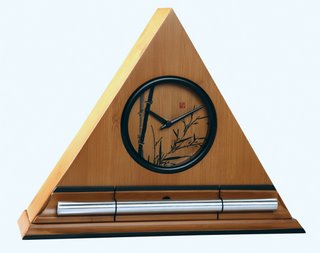 Zen Alarm Clock with Progressive Chime Now & Zen’s Mindfulness Timer Store
1638 Pearl Street
Boulder, CO 80302
Posted in Bamboo Chime Clocks, Chime Alarm Clocks, Japanese Inspired Zen Clocks, Meditation Timers, Meditation Tools, mindfulness practice, Natural Awakening, Now & Zen Alarm Clocks, Progressive Awakening, Yoga Timer, Yoga Timers by Now & Zen, Zen Timepiece by Now & Zen, Zen Timers
Create a simple and restful nighttime routine for you and your children
 Create calm and relaxing bedtime rituals Sat Bir Khalsa, a Kundalini Yoga teacher who’s also an assistant professor at Harvard Medical School and a neuroscientist at the Division of Sleep Medicine of Brigham and Women’s Hospital in Boston is studying how a form of Kundalini Yoga breathing called Shabad Kriya helps people with insomnia, offers good news: “Treating the arousal should treat the insomnia.” By creating a routine of soothing rituals, you can bring your nervous system back into balance and transform your sleep patterns for good.
Rituals for Relaxing
Whether it’s yoga to reduce muscle tension, breathing to slow the heart rate, or an herbal massage to calm a racing mind, a hot bath to sooth your tired body, or a bedtime story to slow you and your children’s minds, creating a simple routine can be the most effective way to get a better night’s sleep. Maintaining consistency will help you and your children keep your circadian rhythms—the biological changes that happen every 24 hours—steady. Eventually, your body will naturally understand and crave sleep during these hours. Set your Zen Alarm Clock as part of your bedtime routine.
By Nora Isaacs Yoga Journal
Wake up refreshed, love your alarm clock, transform your mornings with The Zen Alarm Clock’s progressive awakening with gentle chimes.
“The Zen Alarm Clock,” uses soothing acoustic chimes that awaken users gently and gradually, making waking up a real pleasure. Rather than an artificial recorded sound played through a speaker, the Zen Clock features an alloy chime bar similar to a wind chime. When the clock’s alarm is triggered, its chime produces a long-resonating, beautiful acoustic tone reminiscent of a temple gong. Then, as the ring tone gradually fades away, the clock remains silent until it automatically strikes again three minutes later. The frequency of the chime strikes gradually increase over ten-minutes, eventually striking every five seconds, so they are guaranteed to wake up even the heaviest sleeper. This gentle, ten-minute “progressive awakening” leaves users feeling less groggy, and even helps with dream recall.
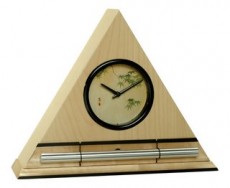 Zen Alarm Clock by Now & Zen Now & Zen – The Zen Alarm Clock Store
1638 Pearl Street
Boulder, CO 80302
Posted in Chime Alarm Clocks, Natural Awakening, Now & Zen Alarm Clocks, Progressive Awakening, Sleep Habits
 Basket of Organic Fruit Ukiyo-e The luxurious awakening provided by the Zen Alarm Clock is part of the growing preference for things natural—natural foods, natural fibers, and now, natural acoustic sounds. Like organic tomatoes in your salad, the organic sounds of the Zen Alarm Clock’s sweet acoustic chimes are truly a gourmet experience.
And those who like organic food may also appreciate how the Zen Clock can be used as an aesthetically sophisticated timer for practices such as yoga or meditation.
 Organic Sound of the Zen Alarm Clock's Chime is Acoustic Come by for a visit:
Now & Zen’s Natural Sounds Alarm Clock Store
1638 Pearl Street
Boulder, CO 80302
(800) 779-6383
Posted in Beauty, Chime Alarm Clocks, Japanese Inspired Zen Clocks, Natural Awakening, Now & Zen Alarm Clocks, Progressive Awakening
 Utamaro Kitagawa Ukiyo-e Print - Now & Zen, Inc., 1638 Pearl Street, Boulder, CO 80302 (800) 779-6383 Incessant mechanical bleating breaks your sweet sleep, and the morning is spoiled before it has even begun. Anyone who has relied on an alarm clock to get them out of bed can relate. Thank Buddha, for this jangling sunrise ritual can be transcended. Now & Zen offers a soothing alternative with the gentle Zen Alarm Clock.
This line of solid maple and walnut clocks uses chimes that emulate Tibetan bells to gently and gradually awaken users over a period of ten minutes. The chimes can also be used for meditation and yoga. To practice zen and the art of waking up, visit Now & Zen’s Headquarter Store in Boulder, Colorado.
Excerpt from Attache Magazine (October 2002) – US Airways by Kelly Cunningham
Now & Zen’s Chime Alarm Clock Store
1638 Pearl Street
Boulder, CO 80302
 Solid maple and walnut clocks use chimes to emulate Tibetan bells to wake you
Posted in Beauty, Japanese Inspired Zen Clocks, Meditation Timers, Meditation Tools, Natural Awakening, Now & Zen Alarm Clocks, Progressive Awakening, Well-being, Yoga Timer, Yoga Timers by Now & Zen, Zen Timers
« Previous Page — « Previous Entries
Next Entries » — Next Page »
|
|
|
|